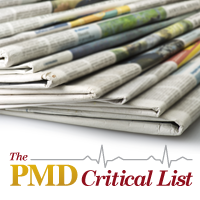- Revenue Cycle Management
- COVID-19
- Reimbursement
- Diabetes Awareness Month
- Risk Management
- Patient Retention
- Staffing
- Medical Economics® 100th Anniversary
- Coding and documentation
- Business of Endocrinology
- Telehealth
- Physicians Financial News
- Cybersecurity
- Cardiovascular Clinical Consult
- Locum Tenens, brought to you by LocumLife®
- Weight Management
- Business of Women's Health
- Practice Efficiency
- Finance and Wealth
- EHRs
- Remote Patient Monitoring
- Sponsored Webinars
- Medical Technology
- Billing and collections
- Acute Pain Management
- Exclusive Content
- Value-based Care
- Business of Pediatrics
- Concierge Medicine 2.0 by Castle Connolly Private Health Partners
- Practice Growth
- Concierge Medicine
- Business of Cardiology
- Implementing the Topcon Ocular Telehealth Platform
- Malpractice
- Influenza
- Sexual Health
- Chronic Conditions
- Technology
- Legal and Policy
- Money
- Opinion
- Vaccines
- Practice Management
- Patient Relations
- Careers
The PMD Critical List: Medical Practices Spend More than $30,000 a Year on Health IT
New health IT initiatives are costing medical practices a pretty penny. That story tops this week’s PMD Critical List. Also making the list: A doctor’s place in the White House, physician shortages drive compensation increases, and how a doctor’s kindness impacts patients.

New health IT initiatives are costing medical practices a pretty penny. That story tops this week’s PMD Critical List. Also making the list: A doctor’s place in the White House, physician shortages drive compensation increases, and how a doctor’s kindness impacts patients.
• Health IT Costs for Doctors $32,000+ Annually (Forbes)
“Doctor-owned multi-specialty practices spent more than $32,500 in 2015 on new health IT, staff, maintenance and related costs last year,” according to a new analysis from the Medical Group Management Association. Bad news for doctors who have seen these costs rise 40% since 2009.
• Physicians Doing More Tests in Their Offices (Wall Street Journal)
A new analysis of recently released Medicare billing data showed that four of the top 10 fastest-growing Medicare services from 2012 to 2014 involved new medical devices that allow doctors to provide services in their offices that they used to refer elsewhere. Less than 10% of doctors accounted for more than half the rise in spending for each service.
• Fed Up With Insurance, Doctors Buck the System (KQED Science)
California’s Dr. Lorraine Page is one of a growing number of doctors who have cut loose from the “assembly-line, volume approach” and is now using a health care delivery model called direct primary care. “Most doctors don’t even think about what they want anymore,” she says. “They get caught up in the system and don’t realize there’s another choice.”
• ObamaCare Sicker Shock (Wall Street Journal)
A hard-hitting editorial from the nation’s top business media outlet on the Affordable Care Act: “Designers said the law would stabilize by its third year as insurers learned to price the exchange population. But turbulence is increasing, not decreasing, and the same dysfunctions can’t be found in other government-managed markets like Medicare Advantage or the FEHB Program.”
• Doctor's Dilemma: Get Political or Stay Out of the Fray? (wbur 90.9)
A compelling essay on doctors and politics by a Harvard Medical School psychiatry professor: “The search for common ground in the political sphere is extremely similar to the search for common ground in the doctor-patient encounter. Most doctors will work hard to find that area where clinician and patient agree.”
• “Sunshine Law” Meant to Protect Doctors from Undue Influence (STAT)
“More than 100 state and national medical societies are trying to water down the Physician Payments Sunshine Act, a law that protects doctors and their patients from undue influence by pharmaceutical and medical device companies.” But the person who wrote the first draft of the act explains that American doctors are being “mislead” on this matter.
• Doctor Shortages Drive Compensation Increases (RevCycle Intelligence)
“The nationwide physician shortage continues to put pressure on healthcare organizations to retain quality employees by boosting compensation and providing incentives to stay at the organization, according to Health eCareers annual salary guide. “Without a doubt, it’s a job seekers’ market and healthcare professionals know it.”
• Does a Doctor’s Kindness Actually Help Us Get Well? (Washington Post)
A thoughtful essay by a respected physician: “It seems obvious: When doctors are kind, patients do better. But when scientists demand proof, persuasive evidence is hard to find. But kindness at every visit is never too much to ask. There is no burden added to the work of doctors if we expect them to be kind. Sometimes doctors don’t need to wait for evidence to do what is right.”
• Why Don't Doctors Recognize Cardiac Arrest? (The Atlantic)
“Clinical researchers find that too many people in medicine are hesitant to believe a patient is in cardiac arrest. And not all are aware of the most effective methods of resuscitation. While critical-care physicians often have plenty of practice resuscitating patients, other doctors, like primary-care physicians, have relatively little.”
